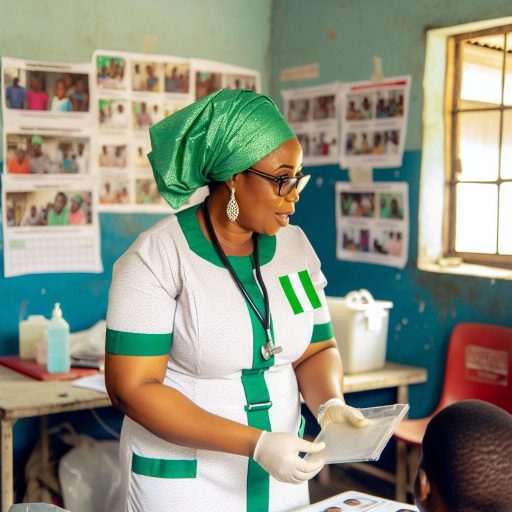Introduction:
Radiology is a branch of medicine that uses imaging techniques to diagnose and treat diseases.
Briefly define radiology:
Radiology involves the use of X-rays, ultrasounds, MRIs, and other imaging technologies.
Highlight the importance of radiology in healthcare:
Radiology plays a crucial role in early disease detection, treatment planning, and monitoring patient progress.
Mention the role of radiologists in diagnosing and treating diseases:
Radiologists are specialized physicians who interpret images, provide accurate diagnoses, and collaborate with other healthcare professionals for effective treatment.
History of Radiology
Radiology has a rich history in Nigeria, dating back to the early 20th century when the first X-ray machines were introduced.
Initially, radiology was primarily used for diagnostic purposes, such as detecting fractures and identifying foreign bodies in the body.
Over the years, radiology has evolved into a diverse and complex medical specialty.
This specialty encompasses various imaging modalities such as X-rays, CT scans, MRIs, and ultrasound.
These technologies have revolutionized the way we diagnose and treat diseases.
They offer non-invasive and accurate assessments of the human body.
One of the key milestones in the development of radiology in Nigeria was the establishment of the Association of Radiologists of Nigeria (ARN).
Founded in the 1960s, the ARN has played a pivotal role in promoting the practice of radiology.
It has set standards for training and accreditation and advocated for the welfare of radiologists in the country.
Another significant advancement was the integration of digital imaging technology in radiology departments across Nigeria.
This transition from film-based radiography to digital systems has improved image quality.
It has reduced radiation exposure and enhanced the efficiency of reporting and archiving patient records.
Moreover, the introduction of teleradiology services has facilitated access to radiological expertise in remote areas.
This innovation enables healthcare providers to consult with radiologists located in urban centers.
Such advancements have bridged the gap in healthcare delivery, particularly in underserved communities.
In recent years, the field of interventional radiology has gained prominence in Nigeria.
This field offers minimally invasive procedures for treating a wide range of conditions, from vascular diseases to cancer.
Interventional radiologists use imaging guidance to precisely target and deliver therapies.
These methods reduce the need for traditional surgery and speed up recovery times for patients.
The history of radiology in Nigeria is a testament to the continuous advancements and innovations in medical imaging technology.
From humble beginnings to modern-day practices, radiology has become an essential component of healthcare delivery.
It improves patient outcomes and enhances the quality of medical care in the country.
Training and Education
To become a radiologist in Nigeria, one must first obtain a medical degree.
After obtaining a medical degree, one can choose to specialize in radiology through residency programs.
Radiology is a dynamic field that requires radiologists to constantly update their knowledge.
Attending conferences, workshops, and pursuing advanced certifications are essential for career advancement in radiology.
- Educational Requirements
- Pathways for Training
- Continuous Education
- Professional Development
Find Out More: Nigerian Dental Schools Offering Oral Biology Programs
Career Opportunities in Radiology
Radiology is a field of medicine that deals with diagnosing and treating diseases using medical imaging techniques.
In Nigeria, there are various career paths available for radiologists, each offering unique opportunities for growth and professional development.
List of Career Paths Available for Radiologists in Nigeria
- Diagnostic Radiology
- Interventional Radiology
- Radiation Oncology
- Nuclear Medicine
- Pediatric Radiology
Each of these career paths requires specialized training and expertise, providing radiologists with the opportunity to focus on specific areas of medical imaging and patient care.
Job Prospects and Demand for Radiologists in the Healthcare Industry
The demand for radiologists in Nigeria is steadily increasing as healthcare facilities recognize the importance of diagnostic imaging in the diagnosis and treatment of various medical conditions.
Radiologists play a crucial role in providing accurate and timely diagnoses, contributing to better patient outcomes.
With advancements in technology and an aging population, the need for radiologists is expected to grow in the coming years.
This creates a positive job outlook for radiologists looking to pursue a career in the healthcare industry.
Potential for Growth and Advancement in a Career in Radiology
As a radiologist in Nigeria, there are ample opportunities for growth and advancement in your career.
Whether you choose to specialize in a specific area of radiology or pursue further education and training, there are pathways available for you to expand your knowledge and expertise.
Transform Your Career with Expert Guidance
Get personalized mentorship consulting that’s tailored to your unique path. Our expert advice is actionable and exclusive.
Get StartedBy staying current with the latest developments in medical imaging technology and advancements in radiology, you can position yourself for career advancement opportunities.
Additionally, networking with other healthcare professionals and participating in continuing education programs can help you stay competitive in the field.
A career in radiology in Nigeria offers a rewarding and fulfilling professional experience, with opportunities for growth, advancement, and making a meaningful impact on patients’ lives.
Discover More: Starting a Career in Chemical Pathology Nigeria
Challenges in Radiology
Being a radiologist in Nigeria comes with its fair share of challenges.
These challenges can significantly impact the practice of radiology in the country.
Identifying these challenges is crucial in finding effective solutions to improve the field.
Equipment Shortage
Radiologists in Nigeria often face the challenge of inadequate or outdated equipment in their facilities.
This scarcity of modern radiology equipment limits their ability to provide accurate diagnoses and treatment.
Lack of Infrastructure
Another common challenge for radiologists in Nigeria is the lack of proper infrastructure to support radiology services.
This includes issues like unreliable power supply, poor internet connectivity, and inadequate storage facilities for medical images.
Funding Constraints
Radiology departments in Nigeria often struggle with limited funding.
This affects their ability to invest in advanced technology, train staff, and maintain quality standards.
This financial constraint can hinder the delivery of high-quality radiology services.
Potential Solutions
Public-Private Partnerships
Collaborating with private entities can help address equipment shortages by leveraging their resources.
This partnership can also improve the overall efficiency and effectiveness of radiology services.
Government Intervention
The government should prioritize healthcare infrastructure development, including radiology services.
This support can enhance the quality of radiology practice in Nigeria.
Professional Development Programs
Implementing training programs and continuous education initiatives for radiologists can improve their skills and knowledge.
This investment in professional development can elevate the standard of radiology practice in the country.
Ultimately, addressing the challenges faced by radiologists in Nigeria requires a concerted effort from stakeholders.
These stakeholders include the government, healthcare institutions, and professional bodies.
By implementing these solutions, the practice of radiology in Nigeria can be enhanced, leading to better healthcare outcomes for the population.
See Related Content: Accreditation and Licensing for Dietitians in Nigeria

Role of Radiology in Healthcare
Radiology plays a critical role in healthcare by providing essential diagnostic imaging services that aid in the accurate diagnosis and treatment of various diseases.
Explore the crucial role of radiology in the diagnosis and treatment of diseases
Radiology helps healthcare professionals visualize internal structures of the body, such as bones, organs, and tissues, to diagnose and treat medical conditions effectively.
Discuss the impact of radiology on patient outcomes and healthcare delivery
Timely and accurate radiological imaging results in improved patient outcomes, as diseases can be detected early, leading to more successful treatment outcomes and reduced healthcare costs.
Highlight the future trends and advancements in radiology that will shape the healthcare landscape in Nigeria
- Advancements in imaging technology, such as 3D imaging and artificial intelligence, will revolutionize how diseases are diagnosed and treated.
- Radiologists are increasingly using minimally invasive techniques, such as interventional radiology, for targeted treatments with fewer complications.
- Tele-radiology is gaining popularity, allowing radiologists to interpret medical images remotely, expanding access to radiology services in underserved areas.
- The integration of radiology with other specialties, like oncology and cardiology, will enhance multidisciplinary patient care and treatment planning.
Find Out More: How to Start a Career in Public Health Technology
Radiology: A Promising Career Path in Nigeria
A career in radiology in Nigeria offers numerous opportunities for growth and impact.
Radiology plays a crucial role in healthcare by providing essential diagnostic and treatment support.
This dynamic field is constantly evolving with technological advancements.
Thus, it becomes an exciting choice for those interested in medicine and technology.
Radiologists in Nigeria can expect a rewarding career.
They have the chance to make a real difference in patient care.
For individuals considering this career path, various options are available.
Options include diagnostic radiography, interventional radiology, and radiation therapy.
With the increasing demand for radiology services in Nigeria, there is a high need for skilled professionals.
Radiology is a vital component of modern healthcare.
Pursuing a career in this field can lead to a fulfilling and impactful profession.
It provides opportunities for growth, development, and contributions to patient well-being.
Readers are encouraged to explore the possibilities a career in radiology offers.
This field has immense potential for growth and impactful work within Nigeria’s healthcare sector.
Embracing a career in radiology can open numerous opportunities.
Ultimately, it enables individuals to make a significant difference in the lives of others.
Additional Resources
Unveiling Research Training Gaps in Oncology: Evaluating a …




